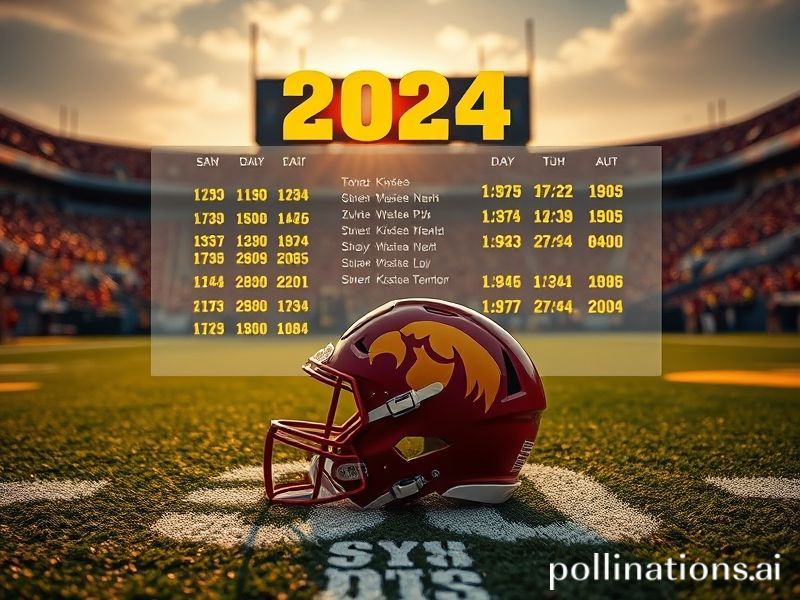Iowa’s Gridiron Globe-Trot: How a Cornfield Schedule Shakes the Planet
From the banks of the Mekong to the banks of the… well, the Cedar River, the planet tilts slightly every August as 80,000 corn-fed pilgrims in black-and-gold descend on a town that smells of hog confinement and hope. The Iowa Hawkeyes’ 2024 schedule has just been released, and—believe it or not—this scrap of Midwestern Americana reverberates from Kyiv to Kuala Lumpur like a poorly microwaved burrito: hot, messy, and impossible to ignore.
On paper, the slate is a tidy twelve-game résumé of regional blood feuds and politely agreed-upon sacrificial lambs. Yet in the grander scheme it is a billboard for late-stage capitalism’s most durable export: the pageant of unpaid labor generating billions in television rights, sportsbook handle, and orthopedic-surgery residencies. Kinnick Stadium will host the usual suspects—Iowa State, Wisconsin, Minnesota—while the Hawkeyes themselves will venture as far as Columbus and Seattle, places where the coffee is strong and the student-loan interest rates stronger.
The international implications? Start with the broadcast footprint. ESPN’s reach extends to 200+ countries and territories, meaning a yak herder in Bhutan can watch an Iowa tight end sprain an ankle in HD while grazing livestock that will never see a scholarship. The Big Ten’s shiny new media deal—seven years, seven billion dollars—outstrips the GDP of several Pacific island nations, proving once again that if you want to move product, put helmets on adolescents and give them a marching band.
Europe, still emotionally hungover from the Euros, scans the schedule with the weary amusement of a continent that invented football, lost the naming rights, and now watches Americans punt on third down for strategic reasons no Geneva Convention could justify. Meanwhile, China’s burgeoning college-sports streaming market—yes, that’s a thing—treats Iowa’s offensive coordinator like a minor deity, because nothing says soft-power diplomacy like play-action passes drawn up by a man whose previous job was coaching linebackers at a high school whose mascot was, naturally, a tractor.
Closer to the equator, Latin American viewers puzzle over the concept of amateurism: million-dollar coaches, billion-dollar networks, and athletes who receive little more than room, board, and the occasional concussion. In Brazil they call this arrangement “jeitinho”; in Iowa they call it “Tuesday.” The schedule’s lone non-conference heavyweight—an early-season tilt at historic Notre Dame—will be simulcast in 35 languages, including Swahili, where the play-by-play man must invent verbs for “three-and-out.”
And then there’s the geopolitical subplot nobody asked for: the September 7 trip to Ames to face Iowa State. This intrastate grudge match is marketed as “El Assico,” a nod to its reliably sloppy brand of football and the existential dread it induces in viewers. Intelligence agencies have long suspected that if hostile actors wanted to destabilize the American heartland, they could simply replay the 2017 edition on loop until the populace voluntarily surrenders. NATO has denied contingency plans, but then again they denied the pipeline leaks too.
The schedule’s back half is where the stakes metastasize. A Halloween weekend visit to Michigan aligns ominously with the U.S. election’s final stretch, ensuring that whichever poor kicker shanks a 38-yarder will be blamed for swing-state voter turnout. By November, when Iowa hosts Nebraska, global supply-chain managers will be watching snap counts instead of container-ship manifests—because if the Hawkeyes somehow stumble into the four-team playoff, the price of corn futures will spike on the assumption that ethanol subsidies are cheaper than therapy for 3.2 million emotionally fragile Iowans.
In the end, the 2024 Iowa football schedule is less a list of dates than a twelve-step program for the human condition: hope, heartbreak, and the comforting illusion that 11 strangers can redeem an entire state’s self-worth before harvest. The rest of the planet, juggling wars, recessions, and climate deadlines, tunes in for the same reason we slow down at car crashes: to confirm that somewhere, someone else is suffering more elegantly than we are. And if that someone is wearing black and gold while waving a foam finger shaped like a stalk of corn, well, pass the remote—this is what passes for diplomacy now.







